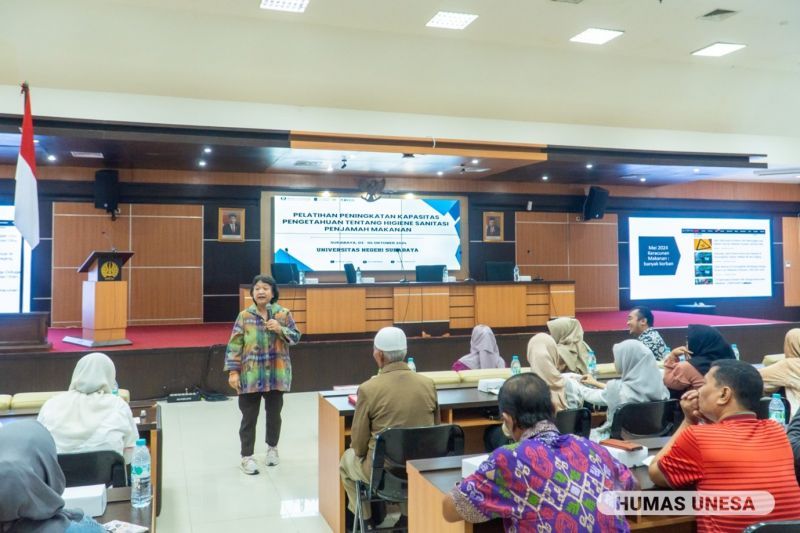UNESA collaborates with Surabaya Health Agency to provide training on food management and halal certification

Unesa.ac.id, SURABAYA-Universitas Negeri Surabaya (UNESA) in collaboration with the Surabaya Health Office (Dinkes) held a Capacity Building Training on Food Handler Sanitation Hygiene on Thursday, October 3, 2024 at the Rectorate Building Campus 2 Lidah Wetan.
Head of Public Health Division of Surabaya Health Office, Dr. Kartika Sri Redjeki said that the training aims to make participants understand the importance of halal, cleanliness, as well as other factors such as the safety of food ingredients, proper cooking methods, and the use of hygienic equipment.
“After completing this series of activities, participants are expected to obtain halal certification and practical knowledge about hygiene and sanitation for food handlers,” she said.
The activity, which lasted two days until October 4, 2024, was attended by a total of 100 participants from food services, canteens, restaurants, hospitals and hotels.
The participants received an in-depth presentation on foodborne diseases and various types of contaminants that can endanger health. This material was delivered by health experts from the Faculty of Medicine, Universitas Airlangga.

After that, participants were given further material by the National Hospitality Certification Institute, which included handling refrigeration equipment, cooking food properly, and independent quality control through the application of HACCP (Hazard Analysis and Critical Control Points).
In the next session, Indonesian Pest Control Practitioners also provided an understanding of pest control, especially insects, flies and rats that are often a problem in food management.
Furthermore, material on laws and regulations related to food hygiene and sanitation, as well as an explanation of the structure and layout of a good kitchen was delivered by representatives of the East Java Provincial Health Office.
Not only that, participants also gained additional knowledge about food preservation methods and the safe use of food additives, delivered by the Surabaya Food and Drug Supervisory Agency (BPOM).
In closing, the Surabaya City Health Office delivered material on the requirements and principles of sanitary hygiene that must be applied in food management places (TPM), to ensure high standards of hygiene and food safety.[]
***
Reporter: Saputra (FBS)
Editor: @zam*
Photo: UNESA HUMAS Team
Share It On: